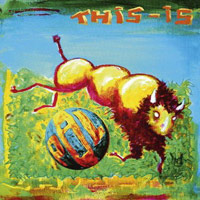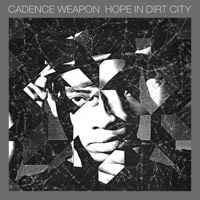
Banga
Columbia
Patti’s a poet, a rock star, a National Book Award winner, the subject of a documentary—in short, an icon. She’s spent almost 40 years as the matron saint of rock & roll poetry. Yet even now, at the fine age of 65, she’s still finding ways to surprise us. One minute into Banga’s lead-off track, “Amerigo,” and her voice, floating over a cloud of strings and steadily pulsing chords, has a gentler timbre than I ever imagined we’d hear from her. Surprise!
Not surprisingly, the lyrics are, almost without exception, worthy of your careful attention, even when the songs are a bit overwrought. The aforementioned “Amerigo,” for example, is full of beautiful images, but is surprisingly romantic about the discovery of “the new world.” The largely improvised and 10-minute long “Constantine’s Dream” can’t be described as a great rock song, but it’s a compellingly poetic performance, as Smith draws connections between the first Christian emperor of Rome and Christopher Columbus (which leads to more singing about the new world). In addition, Patti’s band, including longtime collaborators Jay Dee Daugherty and Lenny Kaye, is solid throughout and always remarkably responsive to her lead. They cover a wide range of styles on the record, playing folky on “Mosaic,” atmospheric on “Tarkovsky, The Second Stop Is Jupitar,” and giving guest star Tom Verlaine room to stretch out on “April Fool.”
Where Smith’s really refused to rest on her laurels is the range of emotions she allows. Just as the album starts to seem like it might be a little mellow, she plows into “Fujisan,” literally calling out and wailing for those affected by the Japanese earthquake last year. That’s followed by a beautiful ballad for the late Amy Winehouse that includes one of the most affecting lines on Banga: “So much for cradling a smoldering bird.” And the remaining tracks lurch from anger (“Banga”) to lament (“Maria”) to joy (“Nine”) before ending with a eulogy for the planet, a cover of Neil Young’s “After the Gold Rush.” Patti’s joined by a children’s choir in the last minute of the song, singing (as Young often alters the lyric himself) “look at mother nature on the run in the 21st century.” Thank heavens, this is no victory lap. Patti Smith is still playing with total abandon.
Matt Slaybaugh

Endless Flowers
Frenchkiss
While Crocodiles hail from San Diego, you’d be forgiven if you’d place them a little further north and bordering a different ocean. Instead of invoking sunkissed beaches, the band comes off like the children of overcast Britain. At the very least, Crocodiles, led by Brandon Welchez (vocals, guitar) and Charles Rowell (guitar), had some worn out Jesus and Mary Chain records at the rehearsal space. It almost seems too lazy to make that reference, but then you hear the record. It’s hardly a new development, as the band has already put its spin on guitar saturation on its previous two albums, but the influence remains omnipresent.
It’s a fine line between inspiration and tribute band territory, and Crocodiles swing wildly between the two. You can trainspot nearly every influence, including a couple of songs reminiscent of The Strokes. But for some reason it doesn’t grate. Welchez and Rowell very wisely steer the proceedings in a direction more poppy than the past. As a result, Endless Flowers is pretty solid, though songs like “Bubblegum Trash” and “Electric Death Song” would work just as well without the window dressing. When the band does let the guitars swell and heave, they push each track close to the wall of sound before backing away at the last moment. It’s a weird paradox that Endless Flowers owes its success to both the similarities and the differences it bears to its obvious DNA. If nothing else, maybe they will make Black Rebel Motorcycle Club work harder.
Dorian S. Ham
MP3: “Endless Flowers”

This Is PiL
PiL Official
Anyone surprised by the reunion of Public Image Ltd should know by now to always expect the unexpected when it comes to Johnny Lydon. In the intervening years, the one-time Sex Pistol has appeared on Judge Judy, reality TV, and the Discovery Channel hosting nature programs, so putting together a PiL reunion in 2009 was the least of the surprises up his proverbial sleeve, even if he had brought Jah Wobble and Keith Levene back into the fold as was rumored at one point.
Unfortunately, during the time off longtime PiL guitarist John McGeoch passed away. He no doubt would have been involved as Lydon has reconnected with the Happy? line-up of guitarist Lu Edmonds (also of The Mekons) and drummer Bruce Smith. A new bassist, Scott Firth, rounds out the team.
PiL didn’t leave off on the best of notes with That What Is Not, though it’s worth noting that of this personnel, only Lydon contributed to that record, and Lydon’s last recorded output, his sole solo venture, 1997’s Psycho’s Path, was a new kind of awfulness. So surprise, surprise once again then that This Is PiL is more than what we might have expected. While certainly not anything mind-blowing, the record eschews the light-gloss hysterics of the band’s commercial heyday, while also not regressing to the bass-heavy minimalism of its early years. Instead, PiL finds a soft spot of taut modernist rock interjected with dub and multi-culti textures and dotted with electronic experimentation. For his part, Lydon has also found a comfort zone where he need not resort to self-parody. In fact, he sounds particularly earnest—as best he can with that distinctive caterwaul—on tracks like “Deeper Water” and “I Must Be Dreaming,” which might be as close as PiL has ever gotten to a ballad. Still, Lydon is best when he gets his dander up, which in this case, is on the surprisingly Britain-proud “One Drop.” As with most of the record, he sounds as self-assured as ever, but somehow older and, while perhaps not kinder, maybe more understanding.
Stephen Slaybaugh

Hope in Dirt City
Upper Class
Canadian 20-something Rollie Pemberton is Cadence Weapon, the Great White North’s second most famous rapper. Number one is Drake, and number three is someone you’ve never heard of. After debuting with all kinds of well-earned hype on Breaking Kayfabe, Pemberton took what one had to hope was a detour into mostly electro dance-rap on Afterparty Babies. But early single “Conditioning” from Hope in Dirt City hinted at not only a return to his serious persona, but also a move to a classic boom-bap sound to boot. It’s enticing because one wants so badly for Pemberton to make another really good album.
Oh well. Though it’s true that CW steps out strong on the first couple of tracks—including the aforementioned single—it is not long before the album becomes lackluster and listless. He’s rapping about girls; he’s rapping about his skills; he’s kinda depressed—it’s just a lazy Kid Cudi imitation when he’s not sounding indistinguishable from peers like Blueprint, POS or Murs. Worse, he frequently destroys his flow by insisting on cramming a few extra syllables in where they just don’t belong. By the time you get to the halfway point, it’s a welcome change of pace when Canada’s fourth most famous rapper, Buck 65, stops by on “(You Can’t Stop) The Machine.” Unfortunately, Buck’s still insisting on rhyming every single line with “yo.” (Well, except for the lines he actually ends with “yo,” but that’s not technically a rhyme, is it?)
One of the potential hallmarks of the record is the extensive use of live instrumentation, i.e. real, live musicians in the studio. Unfortunately, the hired hands seem to have submitted to some kind of Canadian hipster pact, because every time the band takes over, as on the end of “Crash Course for the Ravers,” it sounds like an ’80s Chilliwack instrumental. Ugh. For the record, “Cheval” has really strong rapping and little interference from the band, and the motormouth delivery of “Hype Man” is at least enjoyable. But the peak of the album is the moment when “Conditioning” evolves into a gospel rave-up and CW really is rapping and singing all at once. That’s glorious music, but the rest of the record fails to even come close to living up to it.
Matt Slaybaugh
MP3: “Conditioning”

Human Don’t Be Angry
Chemikal Underground
Arab Strap was a special band, and I don’t mean in the way that your mother once told you certain kids were “special,” though that may have been true too. No, the Scottish twosome of Aidan Moffat and Malcolm Middleton created songs for the ages, even if it required a special person to appreciate them too. They should be as revered as The Smiths, for Moffat had as much poignancy and depressive humor in his lyrics as Steven Morrissey and Middletown possessed a sympathetic ear that manifested itself in musical accompaniment every bit as beguiling as that of Johnny Marr, if not as obvious.
The sum is nearly always greater than the parts, but on their own Moffat and Middletown have both constructed moments every bit as brilliant as those they once made together, albeit, I suppose, with less frequency. For his latest solo foray, Malcom has adapted the moniker Human Don’t Be Angry to get away from, as he puts it, “heart-on-sleeve complaining.” Be that as it may, it’s hard not to notice a title like “Getting Better (At Feeling Like Shit).” That track, which closes the self-titled record, is an instrumental, so perhaps Middletown is, as they say, making progress. He’s also augmented the folksy guitar-playing of his past records with a healthy dose of electronic ephemera, even processing his voice to the point that he sounds like a robot with a brogue on “First Person Singular, Present Tense.” There’s nothing wrong with making a living on heartbreak (and Middleton has admitted as much in song before), but if it takes a device of sorts to get him to be this quirky and adventurous then I’m fine with it.
Stephen Slaybaugh
ALBUM REVIEWS
Sigur Rós, Valtari
The Walkmen, Heaven
Sun Kil Moon, Among the Leaves
Exitmusic, Passage
Kimbra, Vows
El-P, Cancer4Cure
Mount Eerie, Clear Moon
Cornershop, Urban Turban: The Singhles Collection
Simian Mobile Disco, Unpatterns
Beach House, Bloom
The Cribs, In the Belly of the Brazen Bull
Garbage, Not Your Kind of People
Swans, We Rose from Your Bed with the Sun in Our Head
Avengers Assemble: Music from and Inspired by the Motion Picture
